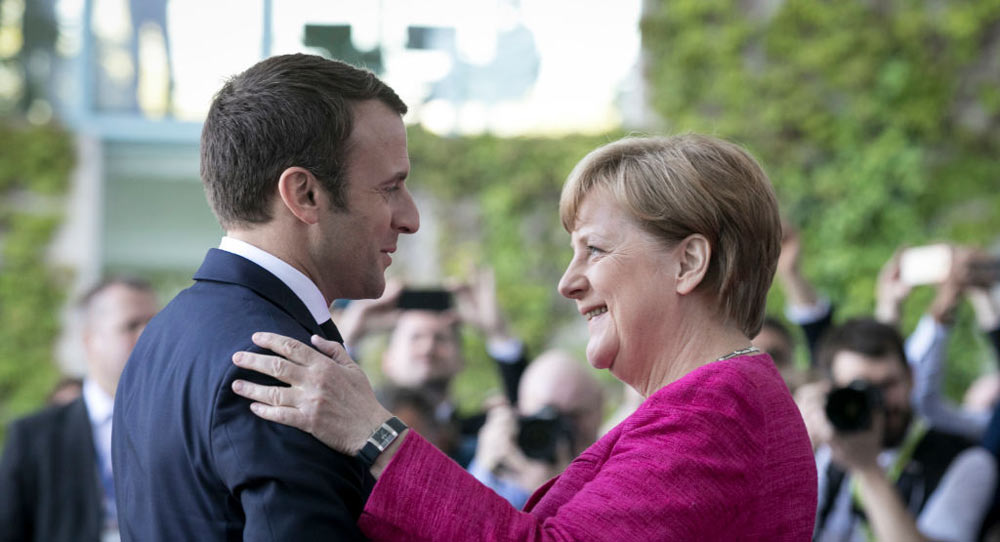Within hours of returning from the May 26–27 G7 summit in Sicily, Angela Merkel hit the campaign trail. With a federal election taking place in September, the German chancellor went on the offensive. The opinion polls give her conservative Christian Democrats a comfortable 10 percentage point lead over the Social Democrats, currently her coalition partners.
But these are early days. Merkel, seeking a fourth term, is taking no chances. During a rally in Bavaria and, later, during a speech in Berlin, instead of praising Germany’s strong economy and low unemployment, Merkel laid into the U.S. administration.
“Recent days have shown me that the times when we could rely completely on others are over to a certain extent,” Merkel said. “We also know that we Europeans must really take our fate into our own hands. . . . It became clear at the G7, when there was no agreement with the USA, how long and rocky this path would be. I think it was good not to gloss over the differences,” she added.
Merkel’s plain speaking not only reflected her frustration with U.S. President Donald Trump’s dismissal of climate change, his criticism of Germany’s trade surplus, and his protectionist tendencies. Merkel was also tapping into an anti-American sentiment, exacerbated by Trump’s hectoring of America’s NATO allies.
The chancellor’s comments were not aimed at Washington. They were aimed at Germans. She does not want to cede any points to the Social Democrats. Both Sigmar Gabriel, the Social Democrat foreign minister, and Martin Schulz, who is running against Merkel for chancellor, are playing the anti-American card. They also disagree with Germany’s commitment to spend 2 percent of GDP on defense. Both issues find resonance among voters.
Merkel may win some points by bashing the United States. But in reality, she and Germany’s interior minister, Thomas de Maizière, have no illusions about the crucial role Washington plays in making Germany safe. The ties between the two countries’ intelligence and security services are “excellent,” as de Maizière made clear in his speech on May 29.
In other words, criticizing the United States is all very well, but believing that Europe can go its own way on security and defense is—to put it mildly—still an illusion.
As Merkel focuses on her reelection bid, over in Paris, the newly elected French President Emmanuel Macron was already putting a stamp on his leadership. The occasion was Russian President Vladimir Putin’s visit to Versailles to mark the three hundredth anniversary of Russian Czar Peter the Great’s trip to France.
The meeting was remarkable for the way Macron pulled no punches. He criticized Russia’s alleged interference in the 2017 French presidential election, particularly by TV channels RT and Sputnik. “They behaved like organs of influence, of propaganda, and of lying propaganda,” Macron said during a joint news conference with Putin.
The French head of state also criticized the Kremlin for backing Marine Le Pen, the populist, anti-EU leader of the National Front, during the election campaign and condemned Putin’s support for Syrian President Bashar al-Assad. Macron didn’t hold back either on speaking up for human rights in Russia.
Until now, it has been left to Merkel to speak out against Putin’s domestic and foreign policies. With the exception of European Council President Donald Tusk, other EU leaders, particularly Federica Mogherini, the bloc’s foreign policy chief, have rarely challenged Putin. Now that Macron is ensconced in the Élysée Palace, Merkel has a valuable ally.
She’s going to need Paris more than ever before. After his talks with Putin, Macron said it was time for a new round of peace talks on Ukraine. The so-called Normandy format, which includes France, Germany, Russia, and Ukraine and which was established to put in place a ceasefire in eastern Ukraine, is stalling. Parts of the region are still occupied by Russian-backed forces.
It’s hard to see Merkel finding the time to break the deadlock over implementing the Minsk accords, which were concluded by the Normandy format with the aim of ending the war in Ukraine, before September. Perhaps Macron’s foreign policy team has some new ideas for how to end the conflict.
In any event, if Macron’s political movement and those parties that have come out in support of the new president perform well in the election for the National Assembly on June 11 and 18, it will boost his leadership at a time when Merkel needs a strong ally in Paris. With the pending talks on Britain’s exit from the EU, an unpredictable U.S. administration, and no end in sight to the war in Syria, the French and German leaders will need more than rhetoric to chart any new course for Europe.








